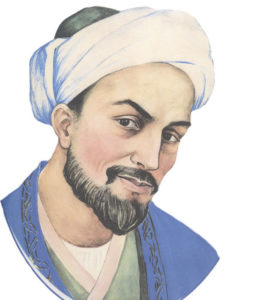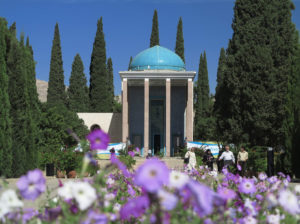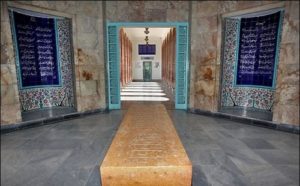
Background
Saadi Shirazi was one of the major Persian poets of the medieval period. He is not only famous in Persian-speaking countries, but has also been quoted in western sources. He is recognized for the quality of his writings and for the depth of his social and moral thoughts.
Saadi was born in Shiraz around 1200 and died around 1292. A native of Shiraz, his father died when he was an infant. Saadi experienced a youth of poverty and hardship, and left his native town at a young age for Baghdad to pursue a better education. As a young man he was inducted to study at the famous an-Nizamiyya center of knowledge (1195–1226), where he excelled in Islamic sciences, law, governance, history, Arabic literature, and Islamic theology.
The unsettled conditions following the Mongol invasion of Persia led him to wander abroad through Anatolia, Syria, Egypt, and Iraq. He also refers in his work to travels in India and Central Asia. Saadi is very much like Marco Polo who traveled in the region from 1271 to 1294. There is a difference, however, between the two. While Marco Polo gravitated to the potentates and the good life, Saadi mingled with the ordinary survivors of the Mongol holocaust. He sat in remote teahouses late into the night and exchanged views with merchants, farmers, preachers, wayfarers, thieves, and Sufi mendicants. For twenty years or more, he continued the same schedule of preaching, advising, learning, honing his sermons, and polishing them into gems illuminating the wisdom and foibles of his people.
When he reappeared in his native Shiraz he was an elderly man. Shiraz, under Atabak Abubakr Sa’d ibn Zangy (1231-60) was enjoying an era of relative tranquility. Saadi was not only welcomed to the city but was respected highly by the ruler and enumerated among the greats of the province. In response, Saadi took his nom de plume from the name of the local prince, Sa’d ibn Zangi, and composed some of his most delightful panegyrics as an initial gesture of gratitude in praise of the ruling house and placed them at the beginning of his Bostan. He seems to have spent the rest of his life in Shiraz.

His works
His best known works are Bostan (The Orchard) completed in 1257 and Gulistan (The Rose Garden) in 1258. Bostan is entirely in verse (epic metre) and consists of stories aptly illustrating the standard virtues recommended to Muslims (justice, liberality, modesty, contentment) as well as of reflections on the behaviour of dervishes and their ecstatic practices. Gulistan is mainly in prose and contains stories and personal anecdotes. The text is interspersed with a variety of short poems, containing aphorisms, advice, and humorous reflections. Saadi demonstrates a profound awareness of the absurdity of human existence. The fate of those who depend on the changeable moods of kings is contrasted with the freedom of the dervishes.
Saadi is also remembered as a panegyrist and lyricist, the author of a number of odes portraying human experience, and also of particular odes such as the lament on the fall of Baghdad after the Mongol invasion in 1258. His lyrics are found in Ghazaliyat (Lyrics) and his odes in Qasa’id (Odes). He is also known for a number of works in Arabic.
For Western students the Bostan and Golestan have a special attraction; but Saadi is also remembered as a great panegyrist and lyricist, the author of a number of masterly general odes portraying human experience, and also of particular odes such as the lament on the fall of Baghdad after the Mongol invasion in 1258. His lyrics are to be found in Ghazaliyat (“Lyrics”) and his odes in Qasa’id (“Odes”). He is also known for a number of works in Arabic. The peculiar blend of human kindness and cynicism, humour, and resignation displayed in Saadi’s works, together with a tendency to avoid the hard dilemma, make him, to many, the most typical and lovable writer in the world of Iranian culture.
The Most Famous Aphorism of Saadi
Saadi is well known for his aphorisms, the most famous of which, Bani Adam, in a delicate way shows the essence of Ubuntu and calls for breaking all barriers between the human beings:
بنى آدم اعضای یک پیکرند
که در آفرینش ز یک گوهرند
چو عضوى به درد آورد روزگار
دگر عضوها را نماند قرار
تو کز محنت دیگران بی غمی
نشاید که نامت نهند آدمی
The poem is translated by A.Marandi as:
Humans are peers of a united race,
Thus in creation, share the same base.
If one is affected with pain,
Others share the faith of same.
When you are indifferent to this pain,
You shall not earn the Humans’ name.


Leave a Reply